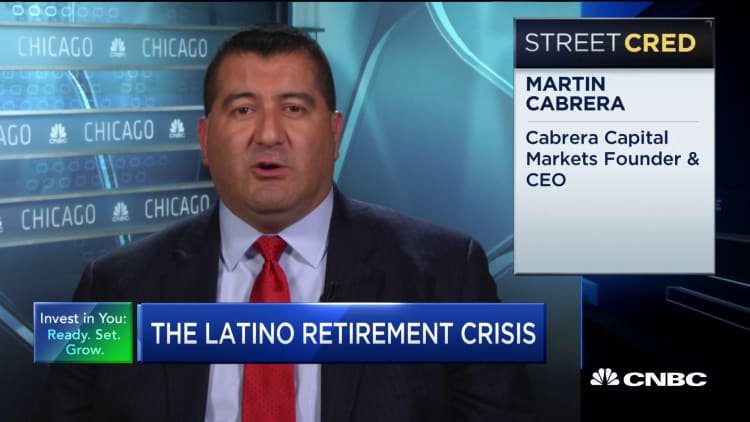
There is a retirement and savings crisis in America, which cuts across every age group, gender and ethnicity.
The average U.S. savings rate in 2019 is 7.6%, compared to an average of 8.8% from 1959-2018.
Because of that, there are few ways beyond a 401(k) plan or other retirement account that prepare you financially for retirement.
Yet, retirement savings for those in the Latino community are low. According to a 2018 UnidosUS report, only 31% of Latino workers participate in an employer-sponsored retirement plan, compared to 48% of all other workers ages 21 to 64.
More from Invest in You:
Barajas: Unbanked Latinos, who once hid cash in mattresses, mayonnaise jars, lack money mentors
There's a retirement crisis in America where most will be unable to afford a 'solid life'
Six ways to kick start your retirement savings
Research also shows that 54% of Latinos work for an employer that offers a retirement plan compared to nearly 70% for all other workers in the same category.
In the recent CNBC and Acorns Invest in You Savings Survey, a question was posed: would you rather ask a family member to borrow money or max out a credit card?
The survey found that Americans with higher incomes and higher education levels are less willing to ask family for help.
It is imperative that Latinos start investing at an early age so that they can enjoy financial stability and flexibility when they are ready to retire.
In fact, 56% of Americans with incomes of $150,000 or more would rather max out a credit card than ask a family member to borrow money. Meanwhile, 52% of whites would rather max out a credit card, while 51% of blacks and 59% of Hispanics would rather ask a family member to borrow money.
Additionally, the recent CNBC and Acorns Invest in You Spending Survey found that 33% of Americans cut spending last year due to loss of employment, lost alternative source of income, took on more debt, or feared recession while 21% increased spending. Also, 54% of those surveyed described themselves as savers not spenders.
When breaking down survey responses, nearly 60% of respondents with yearly income under $50,000 described themselves as savers over spenders. Additionally, about 57% of those in age groups 18 – 34 saw themselves as savers over spenders.
Lack of access
There are several impediments to Latinos saving for retirement.
Often, they have no access or eligibility to employer-sponsored retirement accounts, especially for part time and lower wage workers. In addition, 20% of Latino workers are earning poverty-level wages, which makes it difficult to set aside any money for savings or retirement.
Yet, not all is doom and gloom. Quite the contrary, Latinos make up 58 million, or 18%, of the current U.S. population.
The Latino population is expected to grow to 33% of the total by 2050. The Latino Donor Collaborative estimates the GDP of U.S. Latinos at $2.13 trillion, which would make it equivalent to the 9th largest economy in the world.
The Peterson Institute for Economic International Economics projects that in the next 30 years there will be 18 million new jobs in the U.S. and Latinos may fill the bulk of them.
The U.S. median age for Latinos is 29 compared to 44 for non-Latinos. Approximately 51% of the Latino community is under the age of 30. The percentage of Latinos graduating from high school has jumped to 90% in 2018 from 60% in 1998.
Latinos completing associates, bachelor's, and higher level degrees have accelerated to match the national average. The future for Latinos is extremely bright as more will be graduating with degrees which will lead to higher skilled jobs and higher wages.
Here are several solutions for closing the retirement savings gap for Latinos:
Expand worker savings plans
Part-time and lower wage workers should have the ability to participate in employer-sponsored retirement plans. When Latinos enroll in employer-sponsored plans, their participation rate is 95.4%. When given the opportunity to save for retirement they recognize the value and take full advantage. Another solution would be to further promote the Saver's Credit.
Part-time and lower wage workers should have the ability to participate in employer-sponsored retirement plans.
In addition, there should be further development of state-sponsored retirement plans for private sector workers that automatically enroll individuals into a plan if they are not covered by an employer-sponsored plan.
Since 2012, 43 states have acted to implement, study, or legislate to establish retirement savings programs. There are 10 states that have enacted programs such as that of Illinois' Secure Choice, which automatically enrolls workers into an individual retirement account.
Finally, financial literacy should be taught in homes, grammar schools, and high schools. There are also investment programs, such as "The Stock Market Game," which teaches students the importance of investing at an early age.
A tsunami is coming
There is a Latino tsunami taking place in the U.S.
The combination of demographics, relative youth, highly educated individuals, massive buying power, and the dynamic growth in millions of new jobs will all play a major role in retirement accounts, in addition to making a major impact in the U.S. economy and the global financial markets.
It is imperative that Latinos start investing at an early age so that they can enjoy financial stability and flexibility when they are ready to retire.
Companies that tailor retirement products to this demographic will not only impact the Latino community but also help close the disparity gap and alleviate the retirement crisis in our country.
Martin Cabrera Jr. is the CEO and founder of Cabrera Capital Markets and a member of the Latino Donor Collaborative. He is also a member of the CNBC Financial Wellness Council.
Disclosure: NBCUniversal and Comcast Ventures are investors in Acorns.





